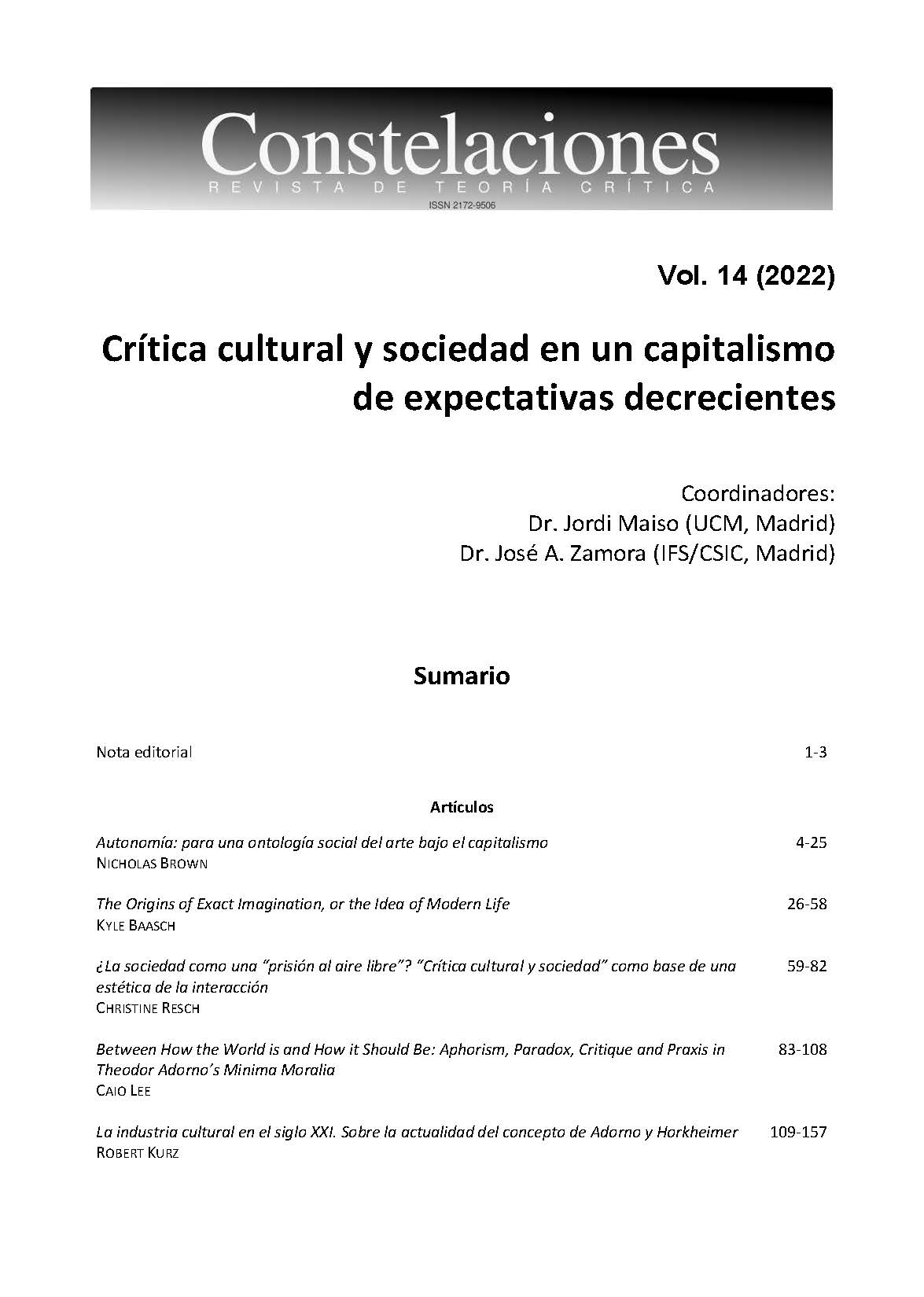¿La sociedad como una 'prisión al aire libre'? 'Crítica cultural y sociedad' como base de una estética de la interacción
Palabras clave:
crítica cultural, Theodor W. Adorno, obra de arte, industria cultural, crítica inmanente, crítica de las ideologías, estética de la interacciónResumen
Este artículo analiza las diferentes formas de crítica cultural que Adorno recoge en su ensayo “Critica cultural y sociedad”. La compresión adecuada de las condiciones de posibilidad de la cultura y el arte que Adorno ofrece al pensamiento y la reflexión compartida en ese ensayo se pone en relación con el programa de una estética de la interacción. En la primera sección se diseccionan los conceptos de crítica del mencionado ensayo con el fin de hacer comprensible cómo se consigue que sean relevantes para la interpretación de los artefactos. En referencia a los estudios de teoría cultural de las ciencias sociales, que desde los años 80 han acentuado cada vez más las lecturas y apropiaciones de la(s) cultura(s), el objetivo en el segundo apartado es tener en cuenta todo el contexto –producción/transmisión/recepción– para el análisis de los artefactos culturales con el fin de reconstruir su significado social.
Descargas
Citas
ADORNO, Theodor W. (1949/51): “Kulturkritik und Gesellschaft”, en Gesam-melte Schriften, (Vol. 10). Rolf Tiedemann (ed.), Fráncfort: Suhrkamp, 11-30.
ADORNO, Theodor W. (1959): “Theorie der Halbbildung”, en Gesam¬melte Schrif-ten, (Vol. 8). Rolf Tiedemann (ed.), Fráncfort: Suhrkamp, 93-121.
ADORNO, Theodor W. (1966): “Über Tradition”, en Gesam¬melte Schriften, (Vol. 10). Rolf Tiedemann (ed.), Fráncfort: Suhrkamp, 330-336.
ADORNO, Theodor W. (1969): “Freizeit”, en Gesam¬melte Schriften, (Vol. 10). Rolf Tiedemann (ed.), Fráncfort: Suhrkamp, 645-655.
ADORNO, Theodor W. (1970): Ästhetische Theorie, en Gesam¬melte Schriften, (Vol. 7). Rolf Tiedemann (ed.), Fráncfort: Suhrkamp.
BOURDIEU, Pierre (1979/esp.: 1988): La distinción. Madrid: Taurus.
BÜRGER, Peter (1974/esp. 1987): Teoría de la vanguardia. Barcelona: Edicions 62.
CREMER-SCHÄFER, Helga (2019): “Kritik & Freundlichkeit”, Widersprüche 151, 39, März, 65-76.
HORKHEIMER, Max y Theodor W. ADORNO (1944/47) “Dialektik der Auf¬klä-rung. Philosophische Fragmente”, en: M. Horkheimer: Gesammelte Schrif¬ten, (Vol. 5). G. Schmid Noerr (ed.). Fráncfort: Fischer, 11-290
KIEDAISCH, Petra (1995) (ed.): Lyrik nach Auschwitz? Adorno und die Dichter. Stutt-gart: Reclam
KEMP, Wolfgang (2015): Der explizite Betrachter. Konstanz: konstanz university press.
MARCUSE, Herbert (1937): “Über den affirmativen Charakter der Kultur”, en Id.: Kultur und Gesellschaft I. Fráncfort: Suhrkamp, 56-101.
MARCUSE, Herbert (1977): “Die Permanenz der Kunst. Wider eine bestimmte mar¬xistische Ästhetik”, en Schriften, (Vol. 9), Springe: zu Klampen, 193-241.
NIEDERAUER, Martin (2014): Die Widerständigkeiten des Jazz. Sozialgeschichte und Improvisation unter den Imperativen der Kulturindustrie. Fráncfort: Peter Lang.
PETERSON, Richard A. (1992): “Understanding audience segmentation: from elite and mass to omnivore and univore”, Poetics 21(4), 243-258
RESCH, Christine (1999): Die Schönen Guten Waren. Die Kunstwelt und ihre Selbst-darsteller. Münster: Westfälisches Dampfboot
RESCH, Christine (2012): Schöner Wohnen: Zur Kritik von Bourdieus “feinen Unter-schieden”. Münster: Westfälisches Dampfboot
RESCH, Christine y Heinz STEINERT (2003): Die Widerständigkeit der Kunst. Ent-wurf einer Interaktionsästhetik. Münster: Westfälisches Dampfboot
RESCH, Christine und Heinz Steinert (2016): “Industria Cultural: Conflictos en torno a los medios de producción de la clase culta”, Constelaciones. Revista de Teoría Crítica, 3(3), 24–60.
RESCH, Christine (2022): Begriffs- und Wahrheitspolitiken Kritischer Theorie. Müns-ter: Westfälisches Dampfboot.
Descargas
Publicado
Cómo citar
Número
Sección
Licencia
Derechos de autor 2022 Christine Resch

Esta obra está bajo una licencia internacional Creative Commons Atribución-NoComercial-CompartirIgual 4.0.
Aquellos autores/as que tengan publicaciones con esta revista, aceptan los términos siguientes:
1. Los autores/as conservarán sus derechos de autor y garantizarán a la revista el derecho de primera publicación de su obra, el cuál estará simultáneamente sujeto a la Licencia de reconocimiento de Creative Commons CC BY-NC-SA 4.0 que permite a terceros compartir, redistribuir y adaptar la obra siempre que sea con fines no comerciales y se indique su autor y su primera publicación esta revista.
2. Los autores/as podrán adoptar otros acuerdos de licencia no exclusiva de distribución de la versión de la obra publicada (p. ej.: depositarla en un archivo telemático institucional o publicarla en un volumen monográfico) siempre que se indique la publicación inicial en esta revista.
3. Se permite y recomienda a los autores/as difundir su obra a través de Internet (p. ej.: en archivos telemáticos institucionales o en su página web) antes y durante el proceso de envío, lo cual puede producir intercambios interesantes y aumentar las citas de la obra publicada. (Véase El efecto del acceso abierto).
Confidencialidad de los datos
1. Constelaciones. Revista de Teoría Crítica garantiza que los datos que nos envíe serán utilizados únicamente para atender sus demandas manifestadas en este mensaje.
2. Sus datos no serán cedidos a terceros.
3. Cuando lo desee puede solicitar que sus datos sean eliminados de nuestros registros.





